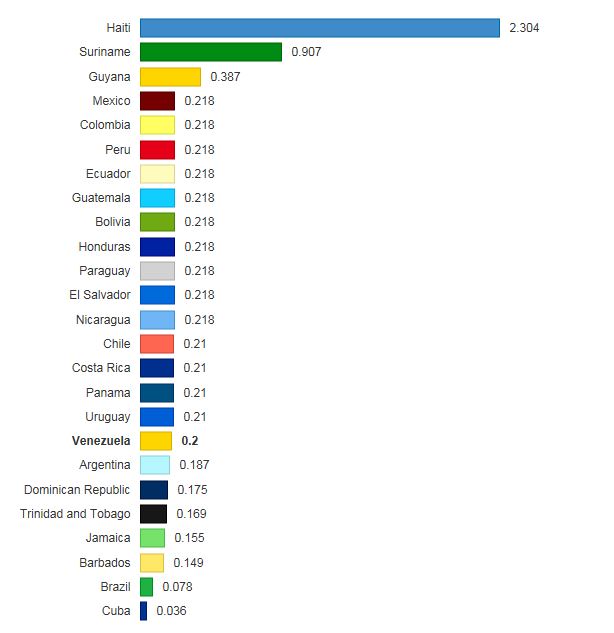The Global Slavery Index has identified Mexico, Haiti, and Brazil as the countries with the highest number of people subjected to modern slavery in the Americas, partly due to the criminal groups in these countries who exploit children and other vulnerable populations.
According to the 2014 Global Slavery Index, which is produced by the Walk Free Foundation, 3.6 percent of the estimated 35.8 million people living in some form of modern slavery are in the Americas.
The report identified Haiti as the country in the region with the highest percentage of its population in slave-like conditions, with an estimated 237,700 people deprived of their freedom.
According to the Index, Mexico is home to the greatest number of people living in slave-like conditions, with over 260,000 individuals subjected to some form of modern slavery, followed by Haiti, Brazil, and Colombia, as indicated in the graphic below.
Prevalence of Modern Slavery in Latin America
Estimated people living in modern slavery

Percent of Population

InSight Crime Analysis
There are several ways that organized crime plays a role in subjecting vulnerable populations -- including children and undocumented migrants -- to slavery.
In Mexico, cartels use children to carry out illegal activities including drug trafficking, surveillance, and targeted assassinations. A senior advisor on human rights from Refugees International told InSight Crime in July that an estimated 20,000 to 30,000 children have been recruited by criminal organizations in the country, and that many are used to guide migrants across the border into the United States.
Undocumented migrants are also vulnerable to exploitation in Mexico. Criminal groups have allegedly enslaved migrants and other individuals in labor camps where they are forced to commit murders, process drugs, construct tunnels, serve as lookouts, and work as sex slaves. Mexican criminal groups are also heavily involved in human trafficking for sexual exploitation, with 70 percent of sex trafficking cases reported to the Coalition Against Trafficking in Women and Girls in Latin America and the Caribbean (CATW-LAC) attributed to gangs.
Criminal groups also play a role in exploiting children in Brazil, according to the Global Slavery Index. Gangs in Brazil drug and recruit children to torture and kill their enemies, since minors receive shorter prison sentences than adult gang members.
The exploitation of undocumented migrants is also a major problem in Brazil, particularly in the garment industry. According to the report, about half of the 100,000 Bolivian immigrants in Brazil entered the country illegally, making them especially vulnerable to becoming victims of forced labor. Large numbers of exploited workers are also employed in the construction industry and agricultural sector, as well as in households as domestic workers.
In Haiti's case, many fall prey to a common practice called restavek, in which children from low-income families are sent to live and work in other households. In theory, the restavek system enables poor children to attend school and receive room and board in exchange for helping with chores like cooking, cleaning, and fetching water. In practice, however, the children are often exploited and in some cases verbally, physically, or sexually abused.
According to the report, children in Haiti are also vulnerable to human trafficking into the Dominican Republic for domestic work, child labor, or forced prostitution. This is especially true for those who live in low-income areas controlled by criminal gangs, and children housed in the Internally Displaced Persons (IDP) camps set up after Haiti's January 2010 earthquake.
The Index noted that within Latin America, Brazil had developed some of the most relatively aggressive policies against slavery, including a national program that encourages businesses to boycott suppliers that engage in exploitative labor practices. Policies such as these could force businesses across the region to improve their labor practices. Still, without tougher legislation protecting the most vulnerable populations -- and stronger law enforcement efforts targeting criminal groups -- it's possible such programs will have a minimal impact in countries where hundreds of thousands live in slave-like conditions.